Iron-Rich Foods During Pregnancy
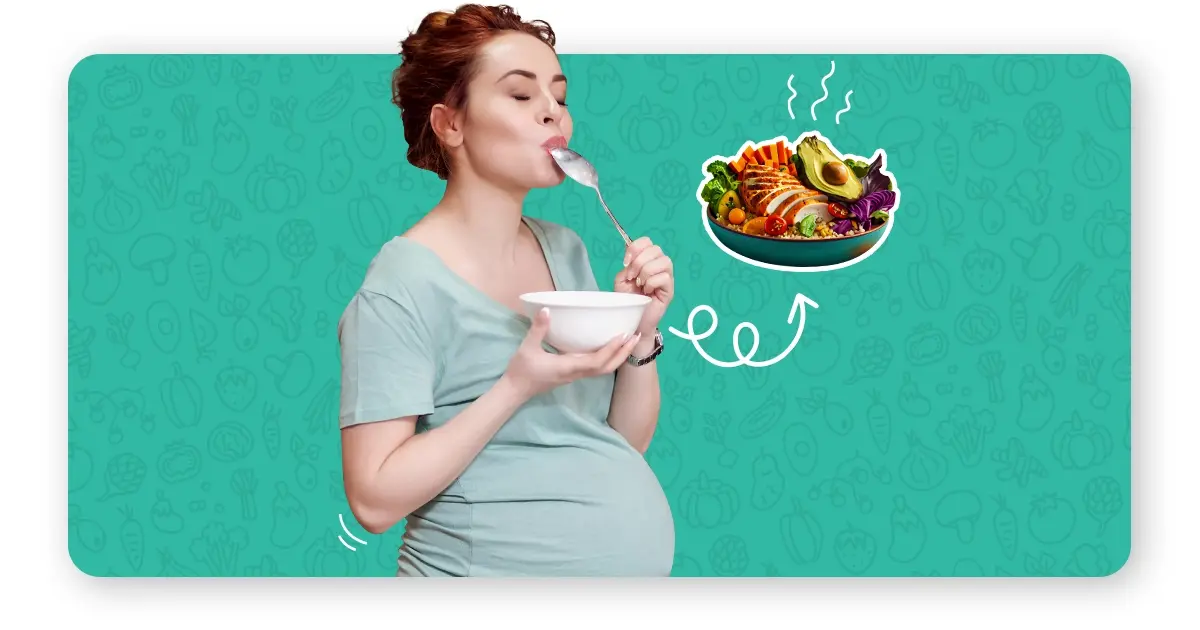
Becoming pregnant is a life-changing moment for every woman. Though it comes with a lot…
Becoming pregnant is a life-changing moment for every woman. Though it comes with a lot of challenges and issues, a good percentage of expectant mothers cannot wait to see their babies in their arms. To bear and beget a healthy baby is the expectation of every mother-to-be. This understanding entails the intake of a healthy diet consisting of essential nutrients and minerals in a balanced way.
Pregnancy also requires maintaining a healthy weight regime, and this should start before deciding to conceive. The OB/GYN, healthcare provider, or midwife involved should possess sound knowledge and experience in caring for a pregnant woman.
The current article, therefore, analyzes the importance of iron rich foods during pregnancy by identifying food sources that effectively aid in the proper absorption of iron for expectant mothers and their babies.
Iron-Rich Foods and Their Significance in Pregnancy
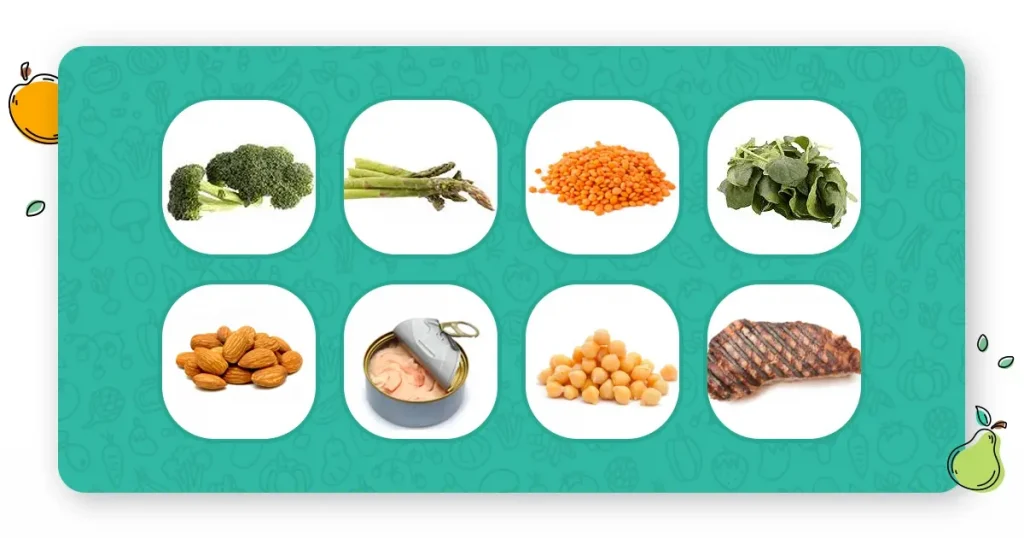
Pregnant women should consume a proper amount of nutrients and minerals, such as proteins, vitamins, calcium, iron, zinc, water, etc., for their and their baby’s well-being (Health Care, 2018). Among these, iron takes a prominent place because it helps in the production of red blood cells, as much as is needed for both the mother and the child within her womb (UCSF Health, 2023). Red blood cells help deliver oxygen to various parts of the body, and iron thus happens to be at the core of this process. Besides, it is through iron that these erythrocytes can produce the pigment, hemoglobin (KJK Hospital (2022).
Since the human body cannot produce iron on its own, it needs to be sourced from food and supplements, such as tablets. Red meat, eggs, seafood, and chicken are rich in iron (UCSF Health, 2023). In the vegetarian category, dark green leafy vegetables, and grains, such as wheat germ, dried beans, and fortified grains, as well as orange juice are good sources of iron.
One must also note that the ‘heme’ present in meat products effectively assists in the quick absorption of iron. As such, vegetables and grains contain ‘non-heme’ iron. Expectant mothers who exclusively intake vegetables should consider adding food rich in vitamin C, as these effectively assist in iron absorption (Ayu Health, 2022).
Iron and Pregnancy
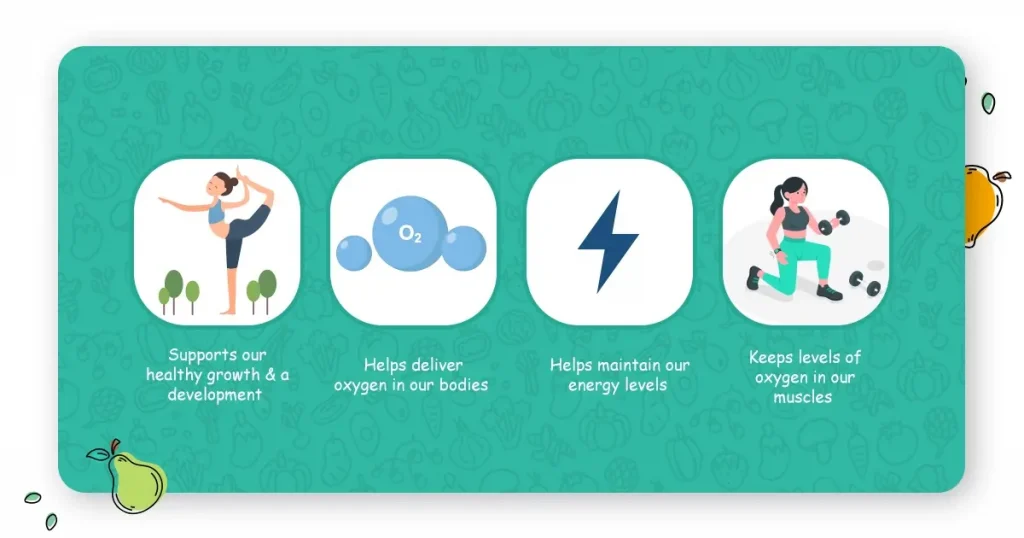
Role of Iron in the Body
Iron is important for the production of red blood cells for all human beings (KJK Hospital, 2022). For mothers-to-be, iron intake is even more crucial because it aids in fetal growth and brain development. As stated earlier, it is critically required for producing hemoglobin, a pigment providing oxygen to all parts of the body (National Institutes of Health, 2022). Iron also helps in producing myoglobin, which, in turn, assists in transporting oxygen to the muscles, thereby keeping up energy levels for all physiologic processes (Eufic, 2021; Abbaspour et al., 2014).
Increased Iron Requirements During Pregnancy
A pregnant woman requires approximately 1000 mg of iron for her and her baby on average (NLM, 1990). One should note that a mother needs this much iron because some have to be reserved (350 mg) for her baby’s development. Moreover, since 250 mg is lost at delivery, one can imagine the amount of blood a mother loses during childbirth. Additionally, expectant mothers should increase their iron intake by 450 mg when they reach their last trimester to safely prepare them for delivery (NIH, 1990).
Consequences of Iron Deficiency & Preventive Measures
Iron deficiency “Anemia” is the main consequence that results from iron deficiency in pregnancy. Severe iron deficiency anemia in this period is more than likely to cause fetal death, uterine malfunction, preterm labor, miscarriage, and even perinatal death (Guo et al., 2019). Suppose, an expectant mother is diagnosed with iron deficiency anemia despite taking the necessary nutrients, she will experience breathing issues, fainting, palpitations, tiredness, and sleeping difficulties.
Findings from NIH (1990) suggested understanding the factors that both enhance and inhibit iron absorption, also those that aid in iron metabolism. Iron absorption is crucial in pregnancy because it helps in fetal growth and development. Also, identifying and consuming foods that aid in quick iron absorption and effective metabolism will help prevent the consequence of iron deficiency anemia (Ayu Health, 2022).
Top Iron-Rich Foods
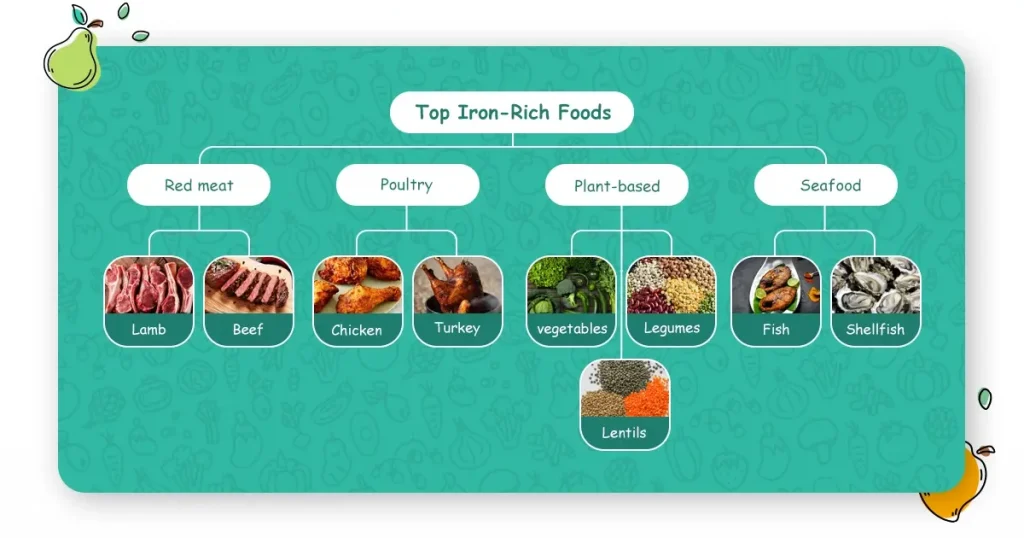
Red meat and poultry, seafood, and plant-based diets are the top-listed iron-rich foods.
The above table presents a series of top iron-rich foods to be taken during pregnancy. Aside from the plant-based iron sources, which have non-heme iron in them, it would be advisable to consider adding red meat, poultry, and seafood in reasonable amounts to get a targeted daily iron intake of 27 mg in this period to prevent iron-deficiency anemia. One particular thing to note is that red meats like beef are high in fat content, and consuming them daily will result in excess fat deposits. This is not advisable for an expectant mother, however, to receive 27 mg of iron, they can ingest lean beef in moderate amounts, advised Ms. Marengo, a registered dietician (2019).
Tips for Maximizing Iron Absorption
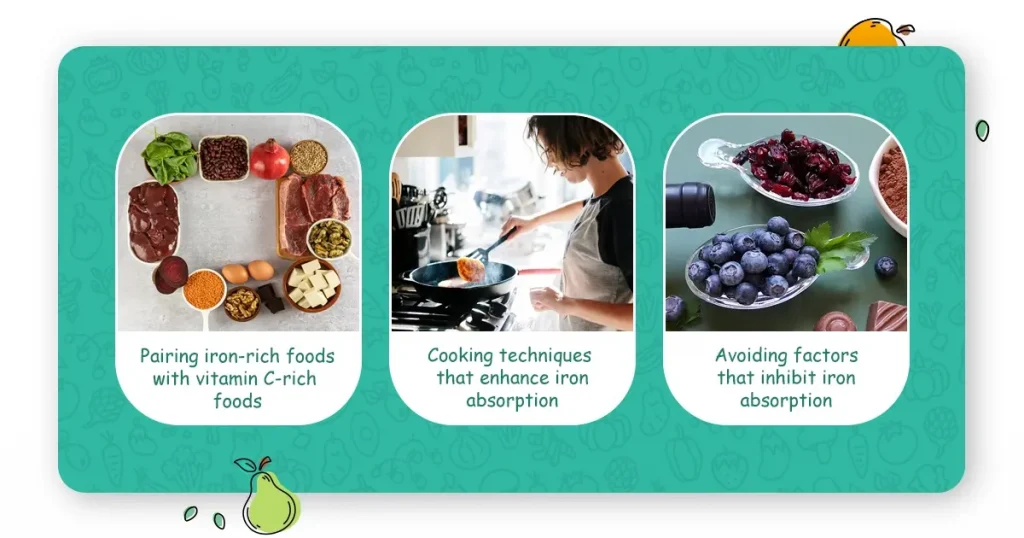
Pairing Iron-Rich Foods With Vitamin C-Rich Foods
Some pregnant women find it difficult to absorb iron even after consuming iron-rich foods. it would be in their best interest to pair iron-rich foods that also contain vitamin C or ascorbic acid, suggested Lewin, R.N. (2023).
Cooking Techniques that Enhance Iron Absorption
Pregnant women should consume well-cooked foods, especially when they are consuming heme-rich iron food. According to Baech et al. (2003), raising the cooking temperature of meats like chicken, lamb, and beef can enhance iron absorption. For plant-based food rich in non-heme iron, one can either have them soaked and cooked or have them washed and eaten raw with salads. At the most, they can be simply heated up to consume as a side dish at dinner. The one thing pregnant women should make note of is that food rich in minerals, fiber, protein, and other macro-cum-micronutrients should be washed properly to prevent any infection.
Avoiding Factors that Inhibit Iron Absorption
Piskin et al. (2022) identified phytic acid, polyphenols, calcium, and oxalic acid as the major iron absorption inhibitors. Whereas, those enhancing iron absorption only included ascorbic acid and animal tissues, with protein and dietary fibers playing mediating roles there.
One effective method to avoid these inhibitors would be to increase the level of food intake rich in ascorbic acid, introduce dietary fibers to one’s diet, or consume red meat rich in heme iron to enhance the rate of iron absorption. Please refer to the below diagram representing ways to avoid iron absorption inhibitors.
Iron Supplements During Pregnancy
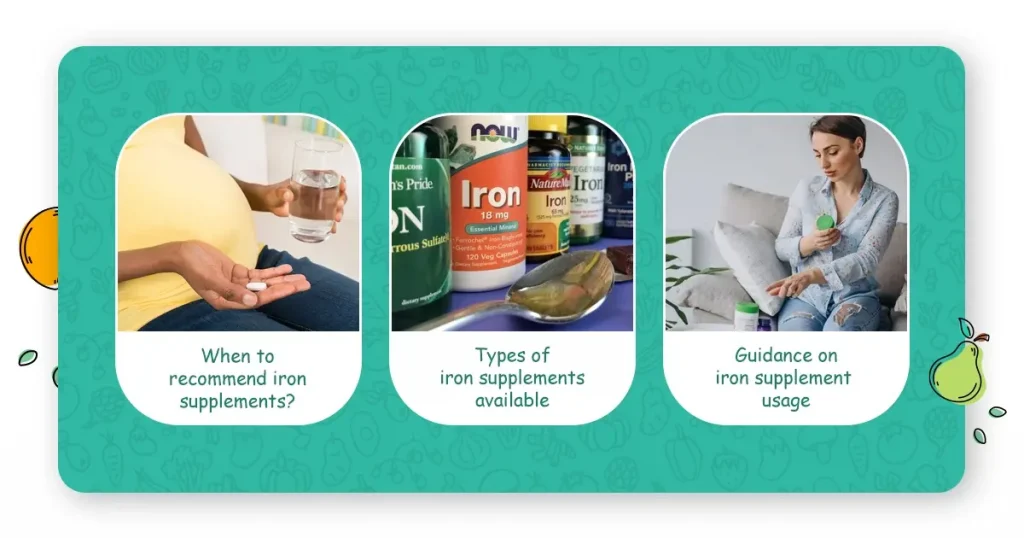
When to Recommend Iron Supplements?
WHO recommends daily iron and folic acid supplement intake as part of its antenatal care throughout pregnancy, especially in cases when iron cannot be effectively absorbed (WHO, 2023). Going on this route will reduce risks related to low birth weight, maternal anemia, and iron deficiency in infants down the road.
Types of Iron Supplements Available
Casey Seiden, a registered and certified dietician and nutritionist (2023) has recommended the following types of iron supplements:
Some expectant mothers can experience side effects when taking these iron pills. It would be feasible for them to report such concerns to their healthcare provider, who will adjust the dose.
Guidance on Iron Supplement Usage
Pregnancy entails iron intake via food or supplements in prescribed amounts. Guidance on appropriate iron supplement usage when having trouble with iron ingestion can be obtained upon consultation with an experienced medical practitioner, preferably an OB/GYN.
Iron-Rich Meal Ideas for Pregnant Women
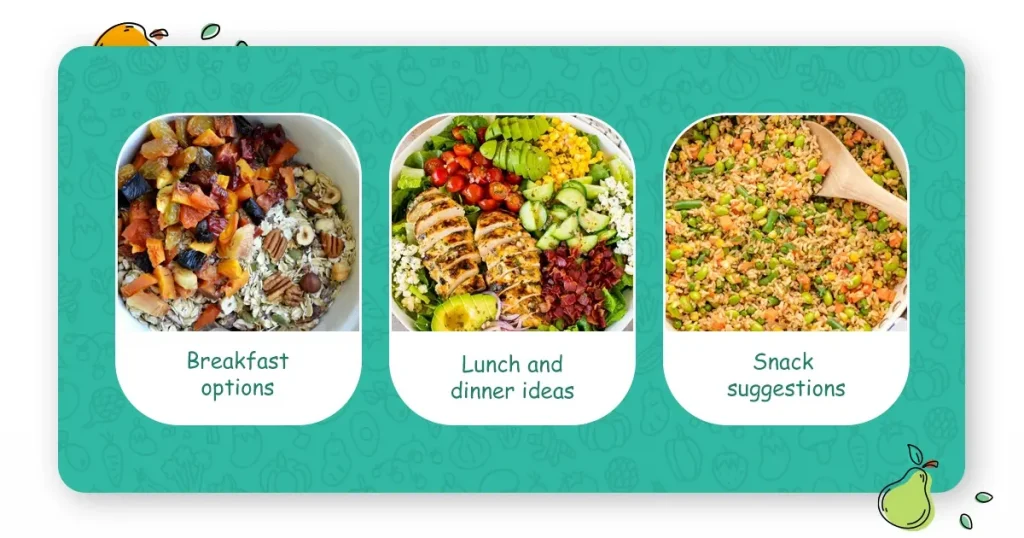
Plenty of options exist to get iron-rich food for breakfast, lunch, dinner, and snack items during pregnancy.
Breakfast Options
- Oatmeal mixed with dried fruit and nuts.
- Bran cereal plus banana, flaxseeds, and low-fat milk.
- Scrambled eggs mixed with spinach, tomatoes, and orange slices.
Lunch and Dinner Ideas
Lunch
Dark leafy greens, raw vegetables, grilled chicken, a cup of black bean soup, cucumbers, chopped chicken breast on spinach, feta cheese, lemon juice, olive oil, and Quinoa salad tossed with tomatoes.
Dinner
Chicken, beef, or turkey, broccoli, sweet potato, baked cod on a wilted Swiss chard bed in garlic and oil, and a side of white rice.
Snack Suggestions
Peanuts, raisins, edamame rice, vegetables, hummus, and trail mix containing dried fruit pieces.
Precautions and Considerations
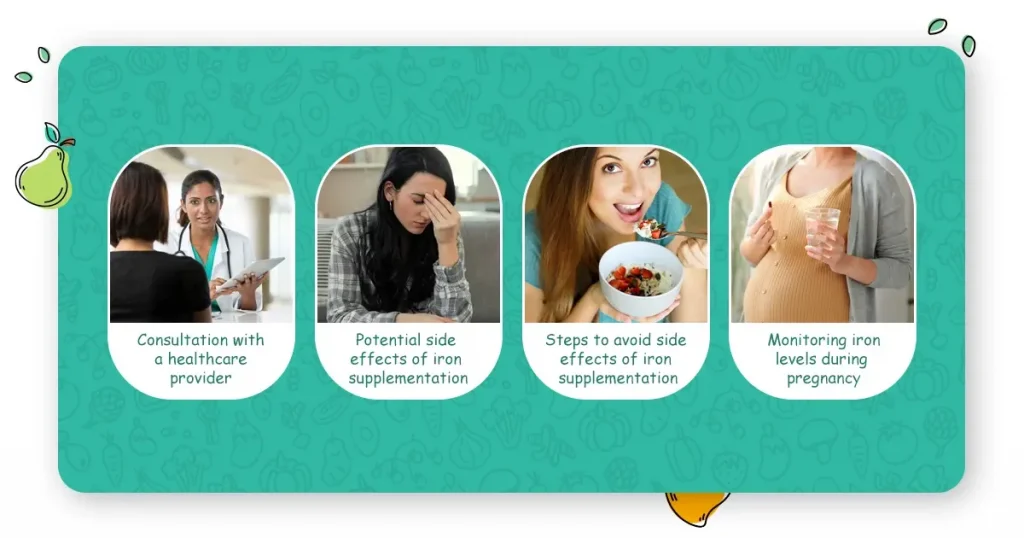
Consultation With a Healthcare Provider
Periodic consultation with a healthcare provider is necessary to assess how pregnancy is progressing to rule out any underlying issues. Since pregnancy involves many aspects to think about and decide, it would be reasonable to select a healthcare provider skilled and trained in pregnancy care and childbirth (Medline Plus, 2022). Seeking advice from an OB/GYN would be highly appropriate because they possess sound knowledge and outlook on pregnancy and childbirth. However, as an expectant mother, you are responsible to choose a highly proficient obstetrician.
Potential Side Effects of Iron Supplementation
- Constipation is one of the most-persistent side effects noticed in pregnancy when taking iron supplementation, especially when one takes it in a pill form (Vinmec, 2019).
- Some expectant mothers may experience abdominal pain/cramping. However, whether or not a pregnant woman is iron deficient, iron supplementation, in any form, is a must to prevent iron-deficiency anemia in the later trimesters of pregnancy.
- Feeling anorexic is another side effect when ingesting iron pills.
- Similarly, one can find dark stools and urine when taking iron pills.
Steps to Avoid Side Effects of Iron Supplementation
While fiber-rich foods will help solve constipation-related side effects of iron supplementation, taking iron pills with meals will resolve the abdominal pain/cramps (Vinmec, 2019). Of note, the second solution also works well for anorexia and/or morning sickness in pregnancy. Regarding the dark stools and urine, these are normal, should not cause any worries, and will go away when stopping the iron pills with care taken to try a more absorbable form of iron. One should only seek medical attention if one notices persistent issues such as these even after briefly discontinuing the iron pills.
Monitoring Iron Levels During Pregnancy
It is very important to monitor iron levels during pregnancy because it lets expectant mothers know their iron status. Noting that the three trimesters of pregnancy require different iron levels and that too in increments, say 250 in the first, 340 in the second, and 450 in the third, these will prompt them to make up for the additional requirements by not only intaking foods rich in iron but also consuming those that will assist in the effective absorption of the same.
Conclusion
Key Takeaways for Pregnant Women:
- Iron is essential for maintaining normal hemoglobin levels in pregnancy.
- The physiologic need for iron is significantly high in pregnancy with increased requirements (1000-1050 mg) in each trimester (Brannon and Taylor, 2017). Hence, it is important to track iron levels from time to time throughout one’s pregnancy.
- Effective and adequate absorption of iron is highly important apart from consuming foods rich in iron content.
- Heme iron (derived from animal flesh) is more highly absorbable than its non-heme counterpart (plant-based).
- Pregnant women relying on plant-based iron should consume vitamin C-rich foods to assist in effective iron absorption.
FAQs
Iron primarily assists in supplying the growing fetus and placenta. Adequate iron levels in pregnancy ensure proper brain development for the fetus and also improves blood count in women for safe delivery.
The heme in red meat, such as lamb and beef, and also poultry including chicken, duck, and turkey, are excellent sources of iron because it helps in the easy absorption of the same.
Yes, there are. Vegetarian food items like dark green leafy vegetables are rich in iron. Whereas, legumes, lentils (peas, chickpeas), nuts (Walnut, Almonds) and seeds (Chia seeds, watermelon, sunflower) belong to the vegan sources. However, the latter section of foods should be ingested with care.
No, you cannot. You either need to start consuming the heme form of iron for its effective absorption or intake food rich in vitamin C to assist in this process.
No because calcium significantly inhibits iron absorption when taken simultaneously. You can, though, separately ingest these minerals.
Yes, there are. Substances like phytic acid, calcium, oxalic acid, and polyphenols are significant inhibitors of iron absorption.

